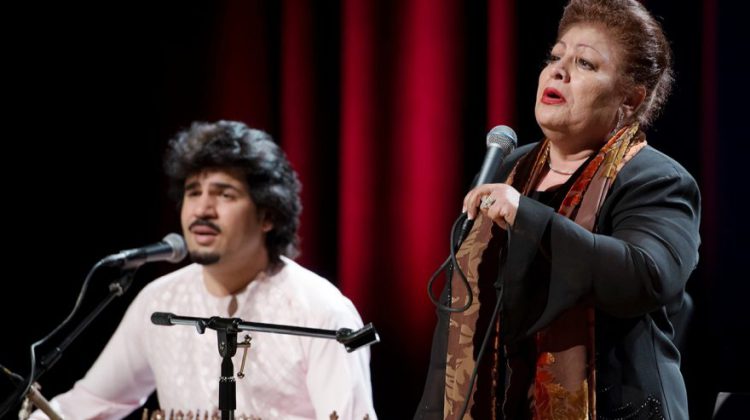
Beloved Afghan Music Icon Ustad Mahwash retires after five decades
Gulalai Farida, known as Ustad Mahwash, is one of Afghanistan’s most beloved musicians, earning titles such as “Ustad” (meaning master) and “Lady of Afghan Music” throughout her illustrious career. After five decades of artistic dedication, she bid farewell to the stage.
Two days ago, Ustad Mahwash made a statement during a concert in Virginia, USA, featuring artists from Afghanistan and Tajikistan. She said, “Today, I am stepping down from the stage and deeply moved. How can I express that I can no longer sing.”
Gulalai Farida, later known as Mahwash, embarked on her musical journey at 21. In the 1970s, during the presidency of Mohammad Daoud Khan, she earned the title of “Ustad” (meaning master). Afghan musicians and experts in the field of music describe her voice as “magical.”
Cultural figures and music enthusiasts attest that Ustad Mahwash upheld the title of “Ustad” with utmost grace until her last moments.
Shekib Mosadeq, an artist, singer, and former judge on the Afghan Star, stated in an interview with Khaama Press that Ustad Mahwash was among the first women to strive for the normalization of Afghan women’s voices, paving the way for other female artists. Mr. Mosadeq emphasized the significance of Ustad Mahwash’s activities, saying, “Mahwash is an incredibly professional artist. Ustad Mahwash and Merman Parwin are the ones who paved the way for female vocalists like Hangama, Ms. Zhila, and others.”
Ustad Mahwash, in a recorded interview with BBC Persian, shared, “In my life, I have fallen in love three times: first with my fiancé, secondly with music, and thirdly with the youth of my homeland.”
Despite Afghanistan not providing an ideal platform for artists, especially female vocalists, Ustad Mahwash dedicated 56 years to this field, and most people know her for her romantic, mystical, and patriotic songs.
Ustad Mahwash considers her most significant artistic achievement her pairing with Ahmad Zahir. This beloved artist began her singing journey during her school days and transitioned to singing on Afghan radio after completing her education. She performed her first song, in 1946 in one of Afghanistan Radio’s studios.
At a concert in Virginia, USA, where she performed the famous song “Vaghti Aashq Shavi,” Ustad Mahwash bid farewell to singing and the stage, stating that she could no longer sing with the same passion and enthusiasm.
Javid Farhad, a poet and cultural figure in Afghanistan, described Ustad Mahwash as an artistically and personally unique phenomenon. He likened her voice to “the melodious sound of rain, filled with passion, freshness, and vitality.”
According to him, “Ustad Mahwash’s voice is the locked voice in the throats of thousands of suffering Afghan women, a voice that can be heard by the oven, behind a table, and in a bedroom.”
Ustad Mahwash’s retirement has elicited various reactions from her admirers. Khoshal Nabizada, a journalist and social activist, described Ustad Mahwash as a “great” human being and emphasized Afghanistan’s need for such influential figures.
Farzad Farnood, another social media user, wrote, “Ustad Mahwash bid farewell to singing at a time when singing for women in Afghanistan is still considered wrong and a crime.”
He added, “Mahwash endured difficult days and faced countless injustices from family and people, all to reach what she believed in.”
Ustad Mahwash created 1500 audio and video recordings during her artistic career and performed concerts in various countries. In 2003, she won the Asia-Pacific International Award for her artistic contributions and songs for Afghan children.
During her farewell performance, Ustad Mahwash stated, “A Muslim woman from Afghanistan can sing for years and continue her musical journey with white hair, just like anyone else in the world of music.”





